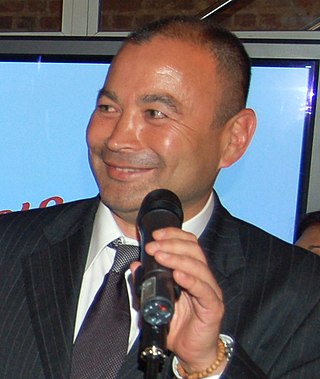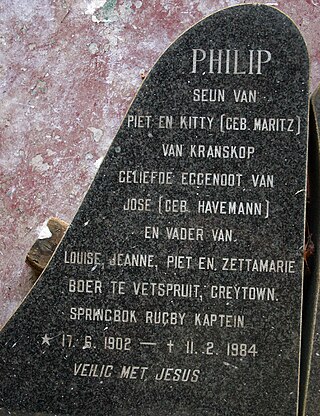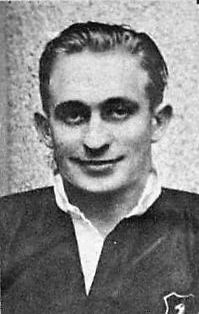
The New Zealand national rugby union team, commonly known as the All Blacks, represents New Zealand in men's international rugby union, which is considered the country's national sport. Famed for their international success, the All Blacks have often been regarded as one of the most successful sports teams in history.

The Australia men's national rugby union team, nicknamed the Wallabies, is the representative men's national team in the sport of rugby union for the nation of Australia. The team first played at Sydney in 1899, winning their first test match against the touring British Isles team.

Edward Jones is an Australian rugby union coach and former player. He most recently coached the Australia national team from January until October 2023. He previously coached Australia, Japan and England. He returned to the role of Japan head coach in January 2024.

Bryan Gary Habana OIS is a South African former professional rugby union player. Playing mainly as a wing, he is widely considered to be one of the greatest players in the history of the sport. He played for the Golden Lions, the Blue Bulls and Western Province in South Africa, for the Bulls and the Stormers in Super Rugby, and for Toulon in the French Top 14, and won 124 caps for the South Africa national team.
The 2005 Tri Nations Series, an annual rugby union competition between the national teams of Australia, New Zealand and South Africa, was the tenth in the series. The competition is organised by SANZAR, a consortium of the three countries' rugby federations. This was the last year in which the Tri Nations was contested in its original double round-robin format, with each team playing the others twice.
The 2004 Tri Nations Series, an annual rugby union competition between the national teams of Australia, New Zealand and South Africa, was the ninth in the series. The competition is organised by SANZAR, a consortium of the three countries' rugby union federations. The series was contested in its original double round-robin format, with each team playing the others twice.

Michael Cheika is an Australian professional dual-code rugby coach and former player who is head coach of Leicester Tigers in England's Premiership Rugby.
The 1971 South Africa rugby union tour of Australia was a controversial six-week rugby union tour by the Springboks to Australia. Anti-apartheid protests came to being all around the country. The tour is perhaps most infamous for a state of emergency being declared in Queensland.
In total, around 700 people were arrested whilst the Springboks were on tour.
Ewen James Andrew McKenzie is an Australian professional rugby union coach and a former international rugby player. He played for Australia's World Cup winning team in 1991 and earned 51 caps for the Wallabies during his test career. McKenzie was head coach of the Australian team from 2013 to 2014. He has coached in both southern and northern hemispheres, in Super Rugby for the Waratahs and Reds, and in France at Top 14 side Stade Français. During his playing days he was a prop and, in a representative career spanning from 1987 to 1997, he played nine seasons for the NSW Waratahs and two for the ACT Brumbies.
The French national rugby union team first competed at the 1900 Summer Olympics.

The 2009 Tri Nations Series was the fourteenth annual Tri Nations rugby union series between the national rugby union teams of New Zealand, Australia and South Africa, respectively nicknamed the All Blacks, Wallabies, and Springboks. The Springboks secured the season crown in their final match on 12 September, defeating the defending series champion All Blacks 32–29 in Hamilton.

Philip Jacobus Nel was a South African rugby player.
Louis Babrow was a South African rugby union player and medical doctor.
The 1992 New Zealand tour rugby to Australia and South Africa was the 28th tour by the All Blacks to Australia, and their 6th tour to South Africa. It was first official visit by the New Zealand team to South Africa since the controversial tour of 1976.
The 2013 Rugby Championship, known as The Castle Rugby Championship in South Africa, The Investec Rugby Championship in New Zealand, The Castrol Edge Rugby Championship in Australia and The Personal Rugby Championship in Argentina for sponsorship reasons, was the second edition of the expanded annual southern hemisphere championship consisting of Argentina, Australia, South Africa and New Zealand. New Zealand as the 2012 holders, was trying to keep their 100% winning record in the championship after winning six from six in 2012.
The 2014 Rugby Championship was the third edition of the expanded annual southern hemisphere Rugby Championship consisting of Argentina, Australia, South Africa and New Zealand. The tournament was won by New Zealand, with South Africa second, Australia third, and Argentina last.

Gerhard Hamilton Brand was a Springbok rugby union footballer who played in 16 tests between 1928 and 1938. Brand has been described as the best kicker of his era, as well as a "magnificent defensive player" with a "wonderful tackle". According to Guinness World Records he executed the longest drop goal in rugby union to date. Brand's 55 test career points for the Springboks set a 27-year record (1938–65), which was eventually surpassed by Keith Oxlee.
The History of the South Africa national rugby union team dates back to 1891, when the British Lions first toured South Africa where they played against South African representative sides. The South Africa national rugby union team played few international matches during a period of international sanctions due to apartheid. Since the end of apartheid in 1994, South Africa has once again fully participated in international rugby.
The 2016 Rugby Championship was the fifth edition of the annual southern hemisphere Rugby Championship, featuring Argentina, Australia, South Africa and New Zealand. The competition is operated by SANZAAR, a joint venture of the four countries' national unions. New Zealand won their first four matches with bonus points to gain an unassailable lead, winning the title for the fourth time.









